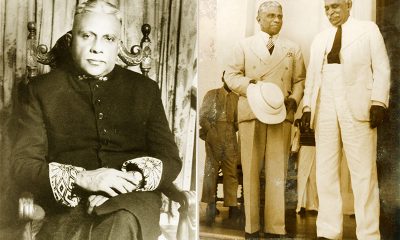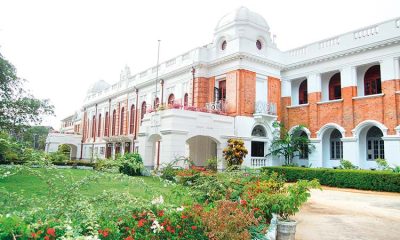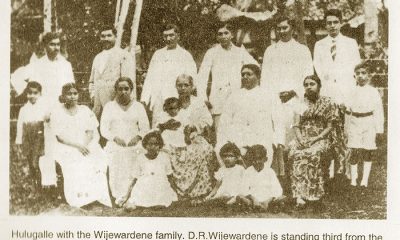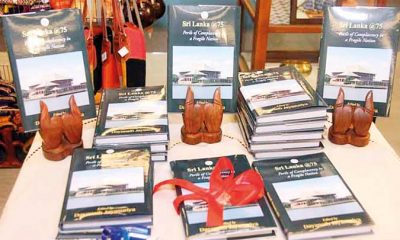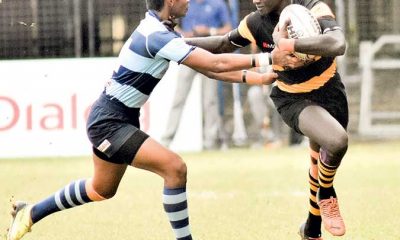Editorial
How we must play the game

We are all familiar with the famous lines of American sportswriter Grantland Rice that “When the Great Scorer comes to mark against your name, he writes not if you won or lost but how you played the game.” Well as far as we Sri Lankans are concerned, we played the game abysmally badly last Sunday when we took on India at the Asia Cup final under overcast conditions at the R. Premadasa Stadium in Colombo.
The lines quoted above, of course, refers to sportsmanship. We were by no means unsporting and have never been so in the international sporting arena. Where we fell flat on our faces was how badly our team played last week to be scuttled out for a mere 50 runs in 15.2 overs to be trounced by 10 wickets.
The records show that this is not our worst ever performance in the white ball game. In 2012, a team that included greats like Mahela Jayawardena, Kumar Sangakkara, Tilakaratne Dilshan and Angelo Mathews was bowled out for a mere 43 runs in 20.1 overs in South Africa. Given that the most recent defeat came days after a nail-biting victory over Pakistan a few days earlier, it was doubly devastating for Lankan fans who paid an unusually high price – not set by us but by Pakistan hosting the tournament – to witness a debacle.
We have to face the fact that our cricket fans are champion cheer leaders when things go right and are quite the reverse when they go wrong as happened in the game against India last week. However, they are not guilty of torching players’ homes as had happened elsewhere. Allegations like match fixing, without a shred of evidence, abounded over the social media and there were demands that Dasun Shanaka who led our team be replaced as captain.
There is no debate that the cricket administration in the country has in recent year sunk to their lowest depths. This is an admitted fact and some halfhearted attempts have been made over the past decades to correct this situation. Gone are the days when people like Robert Senanayake, the younger son of the late Prime Minister D.S. Senanayake, ran the affairs of the then Board of Control of Cricket in then Ceylon (Now Sri Lanka Cricket).
But even then, old timers may remember, when two of the selectors (both good cricketers) picked themselves for the team. Political interventions in cricket have both been for the good like Mr. Gamini Dissanayake winning us the right to play Test cricket and much more and for the bad of which less said the better.
Right now there is very little to be said for the administration and the method of its election. Suffice it be said that Muttiah Muralitharan, our all time great bowler, once said that he could contest any seat in the whole of the country and get elected but it was doubtful that he would get a single vote in a Cricket Board election!
Some on the Interim Boards have been led by unexceptionable people who accepted office not because they hankered for position but because they wanted to do what they could for the game and the country they loved. We’ve had reputed banker, Rienzie Wijetillake, who ran a tight ship and team managers of the calibre of Michael Tissera. There were others like well like Hemaka Amarasuriya and Vijaya Malalasekera. The other side of the coin does not bear examination.
The squad for the 2023 event that will get underway in three weeks’ time is not out yet and we shall know what is to be this time around in a couple of days. On Tuesday, the selectors had met other key stakeholders of the sport and had decided to replace Dasun Shanaka as captain. On Wednesday Dasun visited the High Performance Center at the Premadasa Stadium and had told fellow players that he was quitting. Then he went to Maitland Place for a meeting with the selectors at noon and found that they had made a complete about turn. What prompted the selectors to overturn their original decision? Were there sound cricketing reasons or were they pushed to make the change?
There has been a lot of pressure, inevitably aggravated by out dismal performance on Sunday that the captain, who on his current batting form does not seem to merit a place in the team, must be changed. But as the head coach, Chris Silverwood, said after the recent debacle: “There is much more to being the captain than just scoring runs. Dasun is a very good captain. He is respected by everyone in the dressing room. He understands the players and shows them a lot of love and support and that love and support is returned.”
That’s quite a mouthful. Together with the ground reality that changing the captain at this late stage carries its own considerable downside risk, sensible people will endorse the selectors volte face in going back on their instant reaction to the debacle in the India match. The fans too must realize that lady luck plays a big part in sporting matters. If we had lost the toss and India had chosen to bat as she well might have, events may have rolled in a different direction. However that be, let us give our lads a chance and wish them the very best in India next month. That’s how the game should be played.
Editorial
First they come for criminals …

Monday 24th February, 2025
Sri Lanka’s focus has been shifted from Budget 2025 and the economy to the netherworld of crime and narcotics for all intents and purposes. Since President Anura Kumara Dissanayake presented the NPP government’s maiden budget on 17 Feb., a spree of underworld attacks has sparked a kind of national discourse on crime and criminals.
Close on the heels of Wednesday’s courtroom killing, which shook the country, two suspects arrested for gunning down a person in Kotahena, Colombo, were fatally shot allegedly in a scuffle with the police during ‘a search for weapons’ at Crow Island. A policeman also suffered injury in the clash, we are told. Those killings have provided grist to the Opposition’s mill, and left the NPP government on a sticky wicket.
Friday’s custodial deaths are viewed in some quarters as a sign of the culture of extrajudicial executions returning. This is something a government needs like a hole in the head, especially ahead of an important election. So, it is only natural that the NPP administration had the Acting IGP and the Secretaries to the Ministry of Defence and the Ministry of Public Security give a press conference as a damage control measure, on Saturday. Theirs was an attempt to mitigate the political impact of the surge in crime, the courtroom murder and the custodial deaths on the government.
Secretary to the Ministry of Public Security, former SDIG Ravi Seneviratne, addressing the media, went so far as to attribute the increase in criminal activity to a conspiracy. Giving what may be considered a political twist to the issue, he claimed that there was an attempt to derail investigations into the past emblematic crimes including the Easter Sunday carnage and destabilise the country. He said he had received intelligence reports to that effect; those behind that sinister move had been identified and legal action would be taken against them. Going by his claim, there is a threat to national security. But President Anura Kumara Dissanayake, who is also the Minister of Defence, has categorically stated, in Kandy, that there is no threat to national security. Hasn’t the President taken Seneviratne’s claim seriously, or doesn’t think a move to destabilise the country serious enough to be considered a threat to national security?
Interestingly, in the aftermath of the Easter Sunday tragedy (2019), the then President Maithripala Sirisena claimed that the terror attacks had been intended to scuttle his war on the underworld, especially the drug Mafia. Now, Seneviratne, who was the SDIG in charge of the CID at the time, tells us that the ongoing underworld attacks are aimed at derailing the Easter Sunday carnage probe among other things!
As for conspiracies, we are reminded of what ex-SDIG Seneviratne stated in his testimony before the Presidential Commission of Inquiry (PCoI) that probed the Easter Sunday terror attacks. He and 10 other witnesses insisted that there had been an external hand behind the Easter Sunday carnage. Among others were Archbishop of Colombo Cardinal Malcolm Ranjith and former SSP Shanie Abeysekera.
The police are duty-bound to ensure the safety of all suspects in custody. Friday’s custodial deaths have left another blackmark on the police. A thorough investigation is called for. The police narrative about the killing of the aforesaid crime suspects reminds us of actor/director-turned NPP MP Jagath Manuwarne’s popular teledrama, ‘Kodi Gaha Yata’, wherein a suspect is killed and a policeman suffers injury to a leg under similar circumstances.
The prevailing culture of custodial deaths has rendered everyone vulnerable. First, they come for criminals, and whom they will come for next is anybody’s guess. More importantly, the Sri Lanka police have earned notoriety for wrongful arrests, which are legion. The way they acted following the murder of Seya Sewwandi, a four-year-old girl, in Kotadeniyawa, in 2015, is a case in point. Three suspects including a schoolboy were taken into custody on suspicion and vilified before the real murderer was arrested. Thankfully, the police did not take any of those suspects out as part of ‘an operation to trace illegal firearms’!
Worryingly, the focus of the ongoing public discussion is on the criminals and their rights rather than the victims of crime. Much is being spoken about the serious security lapses that led to the killing of Ganemulle Sanjeewa in the dock, but his victims numbering dozens, and the predicament of their families crying out for justice have not received much attention. The deaths of two suspects in a police shooting are being discussed in Parliament and on political platforms, but the person who perished at their hands in Kotahena has been forgotten.
Editorial
Wisdom after the fact

A lot of wisdom dawns after the fact; and this is what we have seen in the James Bond-style drama that unfolded in Hultsdorf on Wednesday when a high-profile prisoner, Ganemulla Sanjeewa described as an underworld kingpin, was shot dead in the dock by a gunman disguised as a lawyer. A woman accomplice, also pretending to be a lawyer, had smuggled in the revolver used for the shooting. This, ironically, was hidden in a copy of the Criminal Procedure Code hollowed out in the shape of the firearm used.
The victim, categorized as a high-profile prisoner, was brought to court from the Boossa Prison under armed Special Task Force (STF) escort. As he was considered a possible target given his previous criminal record, special arrangements had been made to produce him in court where he faced three cases. But all that proved to be of no avail as he was shot dead at point blank range.
Thanks to the STF which within hours arrested the suspected gunman at Pallavi near Puttalam, the law enforcers have been able to wipe some egg off their faces. But not all of it. The suspect’s woman accomplice has not been arrested at the time of writing although an island wide dragnet had been thrown to arrest her. A police constable who had telephone contact with her is under arrest. While this may not be directly connected to the crime, it speaks volumes of the company some policemen keep.
Undoubtedly there was some very smart police work, aided by CCTV footage from the crime scene, that led to the arrest on the very day the crime was committed. The clothing worn by the killer which he had ditched has been recovered, the vehicle he rode and its driver taken to custody and much more. Hopefully, photographs of the woman now widely distributed would help her early apprehension.
It is not known whether the main suspect now in custody was headed for the coast in an attempt to leave the country by fishing boat. Many criminals guilty of heinous offenses here, both during and after the civil war have escaped to India.
Some of them are now being brought back both from India as well as Dubai where a number of Lankan mobsters are holed out. Television visuals of some of these criminals/suspects with white cloth thrown over their heads being escorted out of the Bandaranaike International Airport is common fare in evening television news.
Some such criminals are reported to be directing underworld activities by telephone, sometimes with participation of jailbirds here. Thankfully, Interpol red notices and other devices used to combat global crime are helping law enforcement in many countries including Sri Lanka.
A lot of crime detection work is now possible by analyzing mobile telephone records. Journalist Keith Noyahr in 2008 was able to escape alive after being tortured by state agents thanks to the location of his whereabouts by telephone signals and a series of telephone calls by VVIPs in the dead of night. Noyahr subsequently fled the country and has refused to return to help prosecute his abductors.
Who can forget Kumaran Pathmanathan, best known by his initials as KP, reputed to be the LTTE’s chief arms procurer and designated as Prabhakaran’s successor who was arrested in Malaysia in August 2009 weeks after the war had ended and brought back to Sri Lanka during Gotabaya Rajapaksa’s time as defence secretary. Although a great ho ha was made about the arrest, he was never prosecuted and continues to live in the north where he has set up an NGO doing charity work enjoying security from successive governments.
Wednesday’s shooting at the Fort Magistrate’s Court in Hultsdorf is not the first of its kind. In January 2004, another underworld figure, Dhammika Amarasinghe, was similarly shot dead by a man disguised as a law student. The assailant was immediately overpowered, arrested and prosecuted. Apart from that, there have been dozens of killings of suspects as well as key witnesses, either on their way to or leaving court.
Then there was also the killing of High Court Judge Sarath Ambepitiya and his police bodyguard in November 2004. Ambepitiya was well known as a ‘no nonsense’ judge imposing stiff sentences on persons convicted in his court. These included a 200 year sentence on LTTE leader, Veupillai Prabhakaran, tried in absentia and jail terms for military personnel for murdering Tamil youth at the Bindunuwewa Rehabilitation Center. He also sentenced two Air Force officers to nine years jail for threatening a senior journalist. Fortunately, his killers were apprehended and successfully prosecuted.
For far too long, gangsters and hardcore criminals have had an unholy nexus with politicians who provided them with cover to thrive. Corruption within the criminal justice system has also encouraged organized crime. Names like Gonawela Sunil, pardoned for an offense of rape and the notorious Soththi Upali rewarded for his services with Gam Udawa contracts will be familiar to most readers.
Breaking this cycle requires urgent reforms, starting with the depoliticization of the police and the Attorney General’s Department. Ensuring these institutions function independently, free from political interference, will help restore public confidence in the justice system and curb the impunity enjoyed by organized crime networks.
Editorial
Crime and politics

Saturday 22nd February, 2025
The Sri Lanka police are known for their swift post-crime response, which however is selective in most cases. On Wednesday (19), they failed to protect an underworld character brought to the Colombo Magistrate’s court. Ganemulle Sanjeewa was shot while in the dock despite a heavy police presence at the court complex. Subsequently, he succumbed to his injuries in hospital. The assassin entered the courtroom, posing as a lawyer. In 2004, an underworld figure, Dhammika Amerasinghe was gunned down inside a courtroom at Hulftsdorp in a similar manner, and his killer was disguised as a law student. The police do not seem to learn from their lapses and blunders.
The NPP MPs never miss an opportunity to inveigh against their Opposition counterparts who were in previous governments that earned notoriety for using underworld gangs to do dirty work for them. The NPP is right in blaming the past governments for the rise of the underworld. Vilfredo Pareto has expounded the theory of the circulation of elites in power politics. In this country, regime changes lead to what may be called the circulation of underworld kingpins. This is how criminals such as Gonawala Sunil, Soththi Upali, Baddegana Sanjeweewa and Wambotta built crime syndicates under different governments.
Gonawala Sunil, a murderer serving a jail term for raping a teenage girl, was released from prison on a presidential pardon and used to unleash violence against the rivals of the UNP under President J. R. Jayewardene’s watch. Soththi Upali, a rapist and contract killer, became more powerful than the police, to all intents and purposes, under President’s Ranasinghe Premadasa’s government. He carried out a large number of attacks on the then Opposition with impunity. Beddegana Sanjeewa, a notorious killer, was appointed as a Reserve Police Inspector and recruited into the Presidential Security Division during President Chandrika Bandaranaike Kumaratunga’s rule. Wambotta, a much-dreaded killer faithfully served President Mahinda Rajapaksa’s government. All of them died violent deaths. There were countless other criminals working for powerful governments. One cannot but agree with the JVP-led NPP that the blame for the institutionalisation of political violence, and the rise of the underworld should be apportioned to the UNP, the SLFP, their coalition partners, and offshoots.
A part of the blame for the perpetuation of links between politicians and the underworld, and the culture of political violence should go to the public as well, for they have no qualms about voting for politicians with underworld connections. They have even elected some accused in murder cases to Parliament. It is said that the government you elect is the government you deserve. It may be people’s lenient attitude towards political violence that made them ignore the JVP’s violent past and vote the JVP-led NPP into power last year.
Making a special statement in Parliament, yesterday, Minister of Public Security and Parliamentary Affairs Ananda Wijepala said the police had arrested Ganemulle Sanjweea’s killer within eight hours of the incident. True, they did so, but that will not extenuate their failure to prevent a murder inside a courtroom. If it is true that the police arrested the murder suspect under their own steam, how come they failed to nab his female accomplice? She had not been arrested by yesterday evening.
Criminal gangs often squeal on one another either to remove their rivals from their path so as to dominate the underworld or to prevent the police from launching massive hunts when the perpetrators of high-profile crimes make good their escape. They often help the police make arrests for reasons of self-preservation. Perhaps, this is what happened after Wednesday’s courtroom killing.
Meanwhile, two policemen have been arrested in connection with the triple murder in Middeniya on Tuesday and the killing of Ganemulle Sanjeewa the following day. Another policeman who allegedly aided and abetted an abortive underworld operation to spring notorious criminal Harakkata free while being held at the CID headquarters, has been brought here from India, where he was arrested. A former Senior DIG has been sentenced to four years RI for having released a suspect arrested for the gang rape and murder of a schoolgirl, S. Vidya, in Pungudutivu in 2015, when he was serving in the North. A constable, who disappeared with his assault rifle has been arrested. There must be many more police personnel in league with criminals. Some military deserters and serving armed forces personnel have also been arrested for their underworld links. It has been revealed that Harakkata’s gang had hired several serving commandos to take part in their planned operation, which failed.
A country has its work cut out to rid itself of organised crime, when its politicians and rogue elements in the police and armed forces collude with the underworld, and the people vote for violent elements. So, the incumbent government should stop labouring under the delusion that the underworld can be neutralised in just months and double down on its efforts to achieve that end.
-

 News5 days ago
News5 days agoCommercial High Court orders AASSL to pay Rs 176 mn for unilateral termination of contract
-
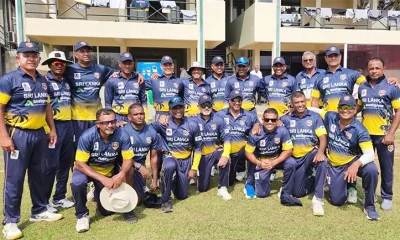
 Sports4 days ago
Sports4 days agoSri Lanka face Australia in Masters World Cup semi-final today
-
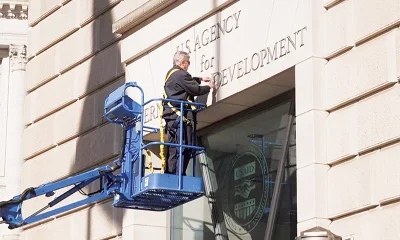
 Features6 days ago
Features6 days agoUSAID and NGOS under siege
-
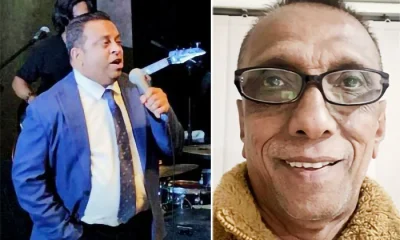
 Features6 days ago
Features6 days agoDoing it in the Philippines…
-

 Midweek Review5 days ago
Midweek Review5 days agoImpact of US policy shift on Sri Lanka
-
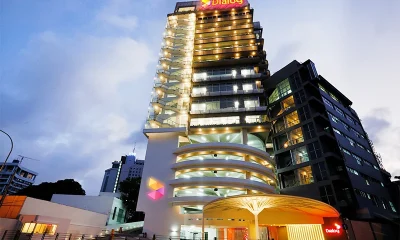
 Business6 days ago
Business6 days agoDialog delivers strong FY 2024 performance with 10% Core Revenue Growth
-

 News4 days ago
News4 days agoCourtroom shooting: Police admit serious security lapses
-
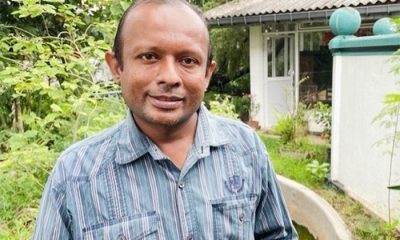
 News5 days ago
News5 days agoFSP lambasts Budget as extension of IMF austerity agenda at the expense of people


